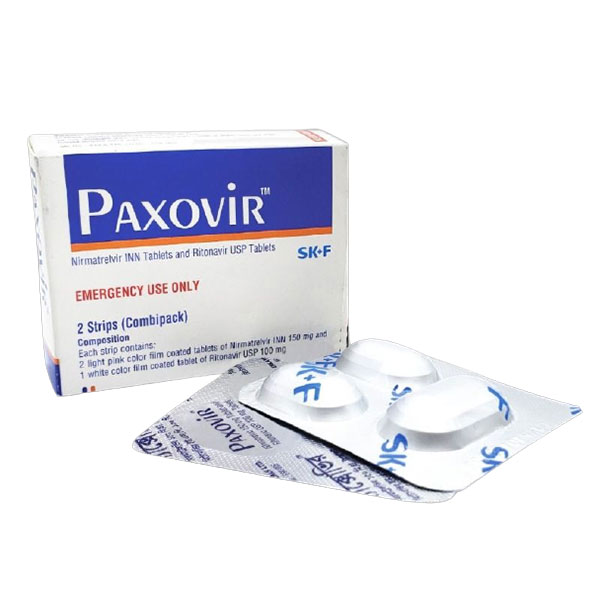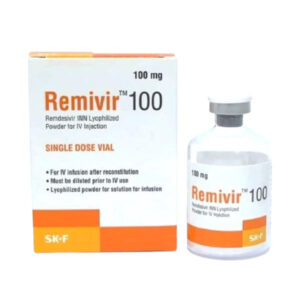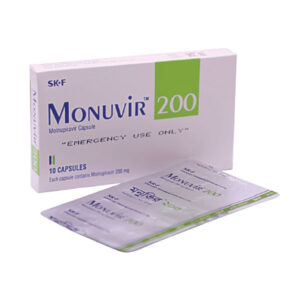PAXOVIR (oral)
$3.00
- 1 pack
Description
DESCRIPTION
Paxovir™ is a combined preparation of Nirmatrelvir and Ritonavir. Nirmatrelvir is a
Peptidomimetic inhibitor of the SARS-CoV-2 main protease (Mpro), also referred to as 3C-like
protease (3CLpro) or nsp5 protease. Inhibition of SARS-CoV-2 Mpro renders it incapable of
processing polyprotein precursors, preventing viral replication. Nirmatrelvir inhibited the
activity of recombinant SARS-CoV-2 Mpro in a biochemical assay with a ki value of 3.1 nM
and an IC50 value of 19.2 nM. Nirmatrelvir was found to bind directly to the SARS-CoV-2 Mpro
active site by X-ray crystallography. Ritonavir is an HIV-1 protease inhibitor but is not active
against SARS-CoV-2 Mpro. Ritonavir inhibits the CYP3A-mediated metabolism of
Nirmatrelvir, resulting in increased plasma concentrations of Nirmatrelvir.
EMERGENCY USE AUTHORIZATION
EUA of Nirmatrelvir, a SARS-CoV-2 main protease (Mpro: also referred to as 3CLpro or nsp5
protease) inhibitor, and Ritonavir, an HIV-1 protease inhibitor and CYP3A inhibitor, for the
treatment of mild-to-moderate coronavirus disease 2019 (COVID-19) in adults and pediatric
patients (12 years of age and older weighing at least 40 kg) with positive results of direct
severe acute respiratory syndrome coronavirus 2 (SARS-CoV-2) viral testing, and who are at
high risk for progression to severe COVID-19, including hospitalization or death.
LIMITATIONS OF AUTHORIZED USE
• Paxovir™ is not authorized for initiation of treatment in patients requiring hospitalization
due to severe or critical COVID-19.
• Paxovir™ is not authorized for pre-exposure or post-exposure prophylaxis for prevention
of COVID-19.
• Paxovir™ is not authorized for use longer than 5 consecutive days.
DOSAGE AND ADMINISTRATION
• Initiate Paxovir™ treatment as soon as possible after diagnosis of COVID-19 and within 5
days of symptom onset.
• Administer orally with or without food.
• Dosage: 300 mg Nirmatrelvir (two 150 mg tablets) with 100 mg Ritonavir (one 100 mg
tablet), with all three tablets taken together twice daily for 5 days.
• Dose reduction for moderate renal impairment (eGFR ≥30 to <60 mL/min): 150 mg
Nirmatrelvir (one 150 mg tablet) with 100 mg Ritonavir (one 100 mg tablet), with both
tablets taken together twice daily for 5 days.
• Paxovir™ is not recommended in patients with severe renal impairment (eGFR <30
mL/min).
• Paxovir™ is not recommend in patients with severe hepatic impairment (Child-Pugh Class
C).
CONTRAINDICATIONS
• History of clinically significant hypersensitivity reactions to the active ingredients
(Nirmatrelvir or Ritonavir) or any other components.
• Co-administration with drugs highly dependent on CYP3A for clearance and for which
elevated concentrations are associated with serious and/or life-threatening reactions.
• Co-administration with potent CYP3A inducers where significantly reduced Nirmatrelvir or
Ritonavir plasma concentrations may be associated with the potential for loss of virologic
response and possible resistance.
SIDE EFFECTS
• Dysgeusia
• Diarrhea
• Hypertension
• Myalgia
PRECAUTION AND WARNING
• The concomitant use of Nirmatrelvir and Ritonavir with certain other drugs may result in
potentially significant drug interactions. Consult the full prescribing information prior to and
during treatment for potential drug interactions.
• Hepatotoxicity: Hepatic transaminase elevations, clinical hepatitis, and jaundice have
occurred in patients receiving ritonavir.
• HIV-1 Drug Resistance: Nirmatrelvir and Ritonavir use may lead to a risk of HIV-1
developing resistance to HIV protease inhibitors in individuals with uncontrolled or
undiagnosed HIV-1 infection.
USE IN PREGNANCY AND LACTATION
There are no available human data on the use of Nirmatrelvir during pregnancy to evaluate
for a drug-associated risk of major birth defects, miscarriage, or adverse maternal or fetal
outcomes. Published observational studies on Ritonavir use in pregnant women have not
identified an increase in the risk of major birth defects. Published studies with Ritonavir are
insufficient to identify a drug-associated risk of miscarriage. There are maternal and fetal
risks associated with untreated COVID-19 in pregnancy. There are no available data on the
presence of Nirmatrelvir in human or animal milk, the effects on the breastfed infant, or the
effects on milk production. The developmental and health benefits of breastfeeding should
be considered along with the mother’s clinical need for Nirmatrelvir and Ritonavir and
potential adverse effects on the breastfed infant from Nirmatrelvir and Ritonavir or from the
underlying maternal condition. Breastfeeding individuals with COVID-19 should follow
practices according to clinical guidelines to avoid exposing the infant to COVID-19.
DRUG INTERACTION
Co-administration of Nirmatrelvir and Ritonavir can alter the plasma concentrations of other
drugs and other drugs may alter the plasma concentrations of Nirmatrelvir and Ritonavir.
Consider the potential for drug interactions prior to and during Nirmatrelvir and Ritonavir
therapy and review concomitant medications during Nirmatrelvir and Ritonavir therapy.
PHARMACEUTICAL PRECAUTION
Store below 25 °C temperature. Keep away from light and wet place. Keep out of reach of
children.
PACKAGING
Paxovir™ Tablet : Combipack box containing 2 strips of 3 tablets each. Each strip
contains 2 light pink color film coated tablets of Nirmatrelvir INN 150
mg and 1 white color film coated tablet of Ritonavir USP 100 mg.
PaxovirTM
Nirmatrelvir INN Tablets and Ritonavir USP Tablets






Reviews
There are no reviews yet.